BJP’s candidate – the lone Muslim candidate in saffron camp – is a turn coat too
By Nivedita Bhardwaj, TwoCircles.net,
New Delhi: While the Matia Mahal constituency is no different than its counterparts from the Walled City area when it comes to civic issues and basic amenities, it has several unique features to its credit.
The civic issues remain the same as other constituencies of the Walled City – congested lanes, dilapidated can-fall-anytime buildings, hanging wires, traffic problem, poor quality water and inadequate parking apart from lack of quality education. The distinguishing characters include – Matia Mahal is the constituency with largest number of electorates among Delhi’s 70 with 3,47,245 voters and irrespective of the parties that he keeps changing, Shoaib Iqbal has won last five consecutive terms (since 1993).

The AAP road show for Asim Ahmad Khan in the vicinity of Jama Masjid in Matia Mahal constituency (Pic courtesy: AAP)
Ahead of the February 7 voting for a new assembly in Delhi, one more unique thing has been added this time is that BJP’s candidate is the lone Muslim pitched by the party from across Delhi. The area has a mixed population of Hindus and Muslims, which comprise almost 40% and hence able to swing results by one-sided voting.
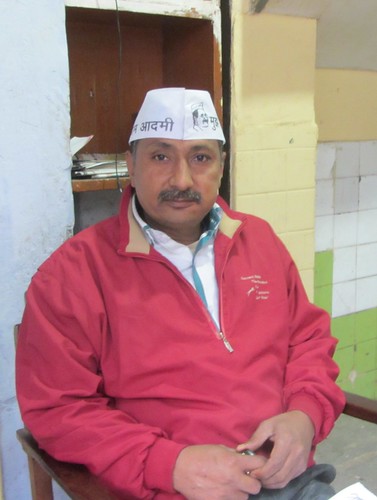
Mohammad Akbar Ansari, a kiryana shop owner, says: “We didn’t trust AAP in 2013 but now every one of us likes AAP.”
The areas under the constituency include large portions of Lal Kuan, Hauz Qazi, Bazar Sitaram, Turkman Gate, Churiwalan, Chawri Bazar, Jama Masjid, Chitli Qabar and Chandni Mahal under the Walled City and Mata Sundari Road, Minto Road, Raus Avenue and Deen Dayal Upadhyay Marg etc right outside it on the southern side.
After his forays into Janata Dal, JD(S), Lok Janshakti Party and latest JD (U) in 2013, Iqbal has now joined and contesting on the Congress ticket. The kind of developmental works that he has carried out – for instances commissioning of number of bore wells – pale in front of the personal help that he has rendered to hundreds of residents in the constituency over the decades.
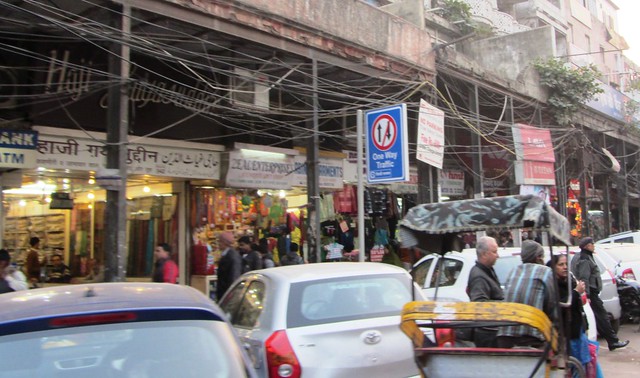
Hanging wires are a constant problem across Walled City. Matia Mahal constituency is no exception to it.
Basics such as bijli-paani-sadak-sewer have taken over the larger issues related to the area. For instance, no one is talking about Jama Masjid overall redevelopment plan for the area. The Mughal-era mosque is a huge draw for tourists, especially foreigners, but does not feature in the electoral narrative of the area.
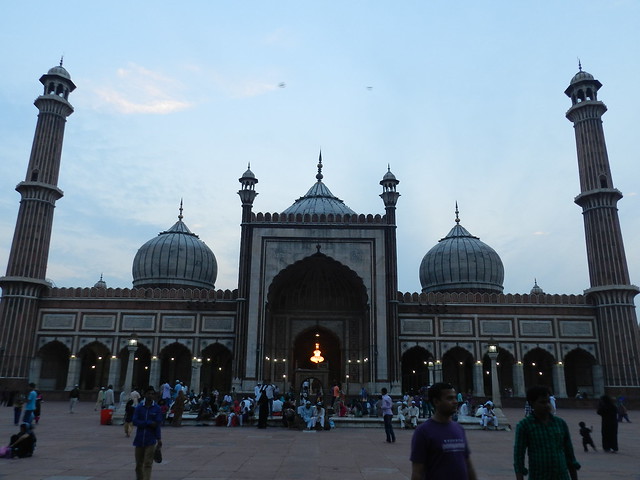
Jama Masjid that is the singular major landmark of the constituency
People in the constituency appear to be divided between Shoiab and the Aam Aadmi Party (AAP). “Had Shoaib not switched sides again, he was sure to win. Now, as he contests on Congress ticket, I doubt if will win. If at all, it will be a very thin margin,” said Mohammad Giassuddin, who runs a tyre shop right across gate no 1 of Jama Masjid.
“BJP runs conversion programmes, it encourages communal riots. AAP had run away in 49 days. Shoaib and Shakil Anjum are quam ke gaddar (betrayers of the community),” says Giassuddin, adding, “I vote for the candidate and not for the party. This time it is a tricky situation.”

Mohammad Giassuddin, who runs a tyre shop right across gate no 1 of Jama Masjid, says: “Had Shoaib not switched sides again, he was sure to win. Now, as he contests on Congress ticket, I doubt if will win. If at all, it will be a very thin margin.”
Interestingly, Asim Ahmad Khan, the AAP candidate, too was earlier in Congress. The young politician – he is just 38 – is drawing good crowds in his road shows, door-to-door campaigns.
Says Ahmed Farooq, a resident of Churiwalan, who runs a machine workshop/mechanic: “AAP is strong in our area. Both Congress and BJP are hopeless. Shoaib has done nothing but dig bore wells everywhere. Instead, remember, power and water bill had gone down during AAP’s regime.”
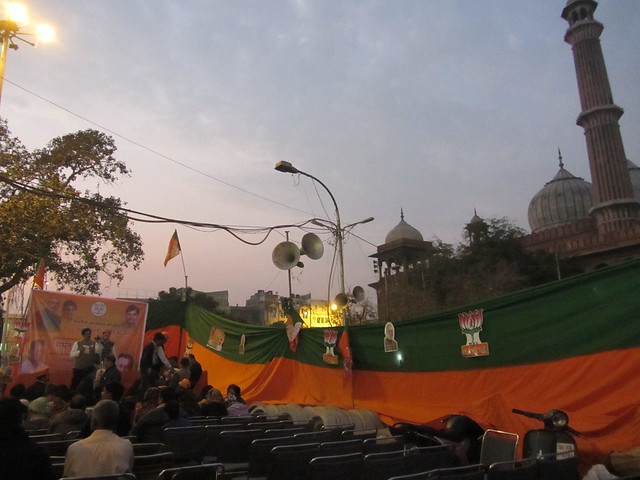
BJP workers readying for a street side meeting right outside Jama Masjid
But try as hard he may, Farooq could not recall Khan’s name.
The AAP-versus-BJP contest across Delhi seats appears to be Congress-versus-AAP here even as BJP is counting on its Muslim face to garner votes. Shakil Anjum Dehlavi was AAP’s candidate in the 2013 assembly polls but now joined and contesting on BJP ticket.
Anjum, who joined BJP only in mid-January, had told Time of India that he quit AAP as “it had deviated from the ideology it was founded on. Ticket distribution wasn’t fair.”

Work in progress – Metro construction on the east of Jama Masjid. The metro has increased to-and-fro connectivity of the Walled City
But for people such as Iqbal and Anjum, Jarrar Ali, a shopkeeper, says, “Jinke dil mein fark hai, woh galat kaam karte hai … dusaron ko join karte hai (Those with difference in their minds, tend to do wrong and join other parties) There is a very minute chance of Shoaib or Anjum winning.”
“AAP is strong here. Chahat aur hamdardi (liking and empathy) with AAP,” he says.
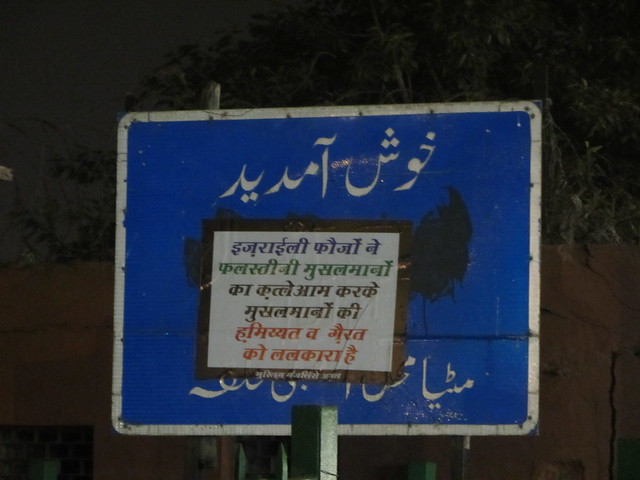
A poster pasted on a road sign board is an example of how strong religious undercurrents are play in Jama Masjid area
Mohammad Akbar Ansari, a kiryana shop owner, visibly, openly supporting AAP – he wears the white cap all the time – says: “We didn’t trust AAP in 2013 but now every one of us likes AAP.”
Another reason why people are willing to try AAP is they are hoping things will improve, work will get done. “In fact, the current AAP candidate has helped people even before the elections,” Ansari says.

In order to avoid voting on similar symbols eating into its votes, AAP has put up posters such as these in the Matia Mahal constituency ((Pic courtesy: AAP)
But the situation is not all black and white. It is complicated by the fact that there are a number of other Muslim candidates in the fray. Imran Hussain of Indian Union Muslim League, Tariq Mirza of Republican Party of India, Mehfuz Khan of Jammu and Kashmir Panthers’ Party, Shafi Dehalvi of Bahujan Mukti Party and six independents. There are a total 17 candidates in the fray here.
Related:

